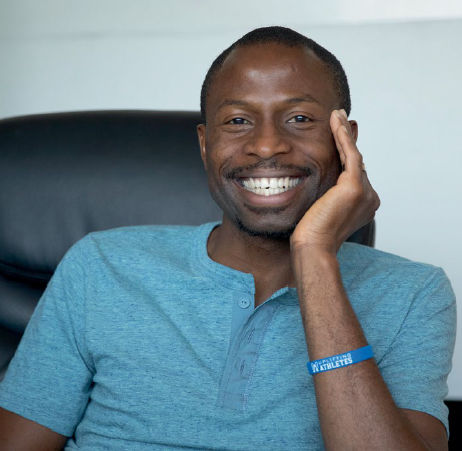Nature Neuroscience celebrated its 25th anniversary, by having conversations with both established leaders in the field and those earlier in their careers to discuss how the field has evolved, and where it is heading. Former JGPT Postdoc, Ukpong Eyo, was interviewed for this special edition.
 Here are a few highlights from the interview:
Here are a few highlights from the interview:
How did you get into neuroscience?
I am a Nigerian by ancestry and a twin by birth. I immigrated to the USA for my undergraduate studies in 2003. My nuclear family and family
of origin mean the world to me. When I was a kid, I wanted to go to medical school. Nigeria is the most populous nation in Africa. It is very competitive to get into college in Nigeria. I had a good academic record, but I still couldn’t get into medical school there. I applied for three years, then my family suggested I emigrate for my college education.
After I emigrated to the USA, it became clear to me that medical school was expensive and unaffordable for me. My advisor, Dr. Peter Kondrashov [now chair of the Kirksville College of Osteopathic Medicine, MO, USA], saw potential in me and suggested that I enter graduate school. I wasn’t sure what graduate school was or entailed, but I took his advice. My original goal was not to build a career in research, but to teach. My mother was a teacher, and I was inspired by her. She is a role model to me. However, she tried to dissuade me from becoming a teacher because teaching doesn’t pay much, and she worried about how well I could financially support my family. Eventually, I joined a biology graduate program at the University of Iowa (USA). My third lab rotation was in a glia biology lab with Michael Dailey, where I fell in love with microglia and then neuroscience.
Mentoring, sponsorship, and role models can be important. Would you like to share the type of support you receive or received?
I have received (and still receive) support from countless people. My undergraduate advisor, Peter Kondrashov, who encouraged me to apply to graduate school and told fun stories about his experiences in graduate school in Siberia (Russia). My graduate mentor, Michael Dailey, taught me so much. From writing and networking to the basics of critical thinking and balancing family life as a researcher. My PhD thesis committee members were all very constructive in guiding me toward completing my PhD work. My postdoctoral mentor, Long-Jun Wu (Mayo Clinic, USA), was unbelievably supportive and gave me lots of opportunities to write grants and to network. I greatly appreciate the opportunity he provided for me to give a talk at the American Epilepsy Society meeting in December 2016, where I met an NIH Program Officer who encouraged me to apply for a K award that I secured the following year. Jonathan (Jony) Kipnis (Washington University, USA), my first department Chair, was always supportive and showed me (in many ways that I continue to unravel) that my voice matters. My current department Chair, Harald Sontheimer (University of Virginia, USA) is a great supporter, sponsor and a mentor to me. John Lukens (University of Virginia, USA) is an incredibly supportive colleague who is an inspiration and always available for a 9 pm call.
The list does not end there and it extends to many more inspiring people, including Michelle Monje (Stanford University, USA), Amy Brewster (Southern Methodist University, USA), Lauren Aleksunes (Rutgers University, USA), Bonnie Firestein (Rutgers University, USA), Tajie Harris (University of Virginia, USA), Nathan Smith (University of Rochester, USA), and Farah Lubin (University of Alabama, USA), whose advice has contributed in countless ways to my work and career development.
I have learned a great deal from every single one of my trainees, too. I am thankful for their feedback and excitement, which motivate me to be a better group leader.
It would not be possible for me to be here without the mentorship and sponsorship of many individuals. Indeed, I am taken aback by their choice to invest and believe in me (even when I didn’t believe in myself). I hope they know how much they have been influential in my research development.
The research culture/landscape is in continuous evolution. What are the positive changes you would like to see? Would you like to share how you contribute to making these positive changes?
I see positive changes in terms of inclusivity. My family of origin is formed of my parents and five siblings, and we are very close. Family is very important to me. When I was a graduate student, I must confess, I felt less represented because of the value I give to having a family than being Black. I just didn’t see many researchers with families or talking about their families. I probably was one of the few people in my cohort who got married while in graduate school. I felt academia was not family friendly.
The first speaker I heard openly talking about his family was Jonathan Kipnis. It was important to me to hear him saying that. He made me feel it was possible to have an academic career and a family. From my graduate school years to today, I see more actions to acknowledge and accommodate the needs of researchers with kids. I think the research culture is becoming more inclusive for researchers of ethnicities under-represented in STEM. I am happy about that. Another positive change is that misbehavior in academia is called out more than in the past. People are more outspoken than in the past, which increases awareness and is helping to make the research community more respectful of different people’s experiences. Thank you for your gracious interest in capturing my journey, interests and thoughts.
You can read the full article here (subscription required).
